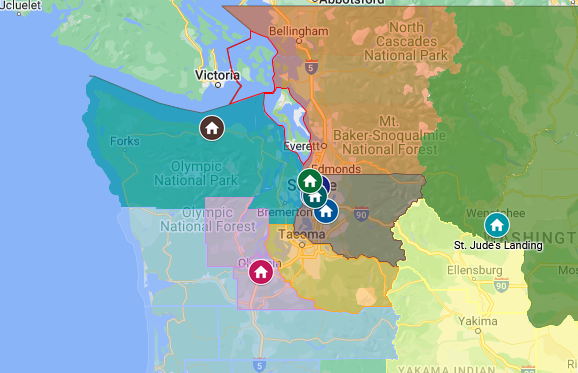The HUD 811 Project Rental Assistance (PRA) grant was awarded to Commerce by the federal Office of Housing and Urban Development (HUD). This grant will provide project-based rental assistance to develop supportive housing for extremely low-income, non-elderly disabled households. The program’s mission is consistent with the guiding principles of the Americans with Disabilities Act and with the 1999 U.S. Supreme Court ruling in Olmstead v. L.C., which requires state and local governments to provide services to individuals with disabilities in the most integrated setting appropriate to their needs. The Department of Social and Health Services (DSHS) is partnering with Commerce to provide and coordinate services.
The Project Rental Assistance (PRA) program provides a project-based rent assistance subsidy for non-elderly persons with disabilities that will cover the difference between the tenant payment and the approved rent. The program collaboration between Commerce and DSHS increases rental housing units for persons with disabilities. We do this by including Section 811 PRA-assisted units in existing, new or rehabilitated multifamily properties with a mix of incomes and disability status.
Tenant eligibility
At the time of admission, at least one person in a household considered for a unit receiving 811 PRA rental subsidies must be non-elderly (18-61 years of age), disabled, and receiving or be eligible to receive Medicaid and services and supports provided through DSHS. Individuals must have extremely low incomes, at or below 30% AMI, and be in the DSHS caseload.
DSHS social workers and case managers will identify and screen clients within their caseloads currently residing in institutional settings and those in home and community-based residential settings for interest in relocating into community-based housing units that receive assistance through the 811 PRA program. DSHS staff will work with owners of properties to stay informed of vacancies and ensure that supportive services are provided to clients. Project owners and other organizations cannot directly refer their clients to 811 PRA-assisted units.
To receive payment, tenant data must be entered into HUD’s Tenant Rental Assistance Certification System (TRACS), and Enterprise Income Verification (EIV) must be used to verify income.
Unit eligibility
An eligible multifamily property can be any new or existing property funded with Washington State Housing Trust Fund, HOME, Washington State Low Income Housing Tax Credit (LIHTC) program, WSHFC Multifamily Bond program, or USDA – Rural Development. Units must not currently have an existing use restriction or a contractual obligation to serve persons with disabilities. Properties must have at least five housing units. No more than 25% of the total units in an eligible multifamily property can:
- be provided Section 811 PRA funds;
- be used for supportive housing for persons with disabilities; or
- have any occupancy preference for persons with disabilities.
However, note that occupancy preferences for housing not currently under contract/developed do not count toward the 25% restriction. The objective of HUD is to expand the inventory of units available to persons with disabilities and not just add subsidies to existing units with these preferences.
Examples:
- A jointly funded HTF and WSHFC project awarded funds for new construction in 2008 has 40 units, eight of which are set aside in the WSHFC contract for households with disabilities. The project could only apply for two 811 PRA units before reaching the 25% threshold.
- A project applies to HTF for funding in 2014 for rehabilitation and does not currently exist in the portfolio. It has 40 units and proposes that 10 units are set-aside for households with disabilities. This project could apply for an 811 PRA subsidy for up to 10 units before reaching the 25% threshold. This is allowable because the set-aside for persons with disabilities is not currently in place at the property.
Units must meet the program criteria for unit integration and accessibility, and accessibility to transportation and services. Units with long-term project-based subsidies do not qualify for the 811 PRA subsidy.
Commerce will enter into Rental Assistance Contracts with owners for a minimum of 20 years with initial funding for five years. Funding beyond the first five years is subject to additional HUD funding. The RAC rent levels will be the higher of FMR or 50% of AMI, with the 811 PRA payments being the difference between that and the tenant payment minus utility allowances.
Resources
- PRAD Program Guidelines (PDF)
- Exhibit 3 – Washington Interagency Agreement (PDF)
- Exhibit 5 – Program Guidelines (PDF)
- Exhibit 7 – Rental Assistance Agreement (PDF)
- Exhibit 8 – Rental Assistance Contract (Part 1) (PDF)
- Exhibit 9 – Rental Assistance Contract (Part 2) (PDF)
- Exhibit 10 – Use Agreement (PDF)
- Exhibit 11 – Model Lease (PDF)
HUD 811 projects map
Are you interested in learning about HUD 811 projects? View a list of all current projects with HUD 811 units in Washington (Excel) or our google map tool.

